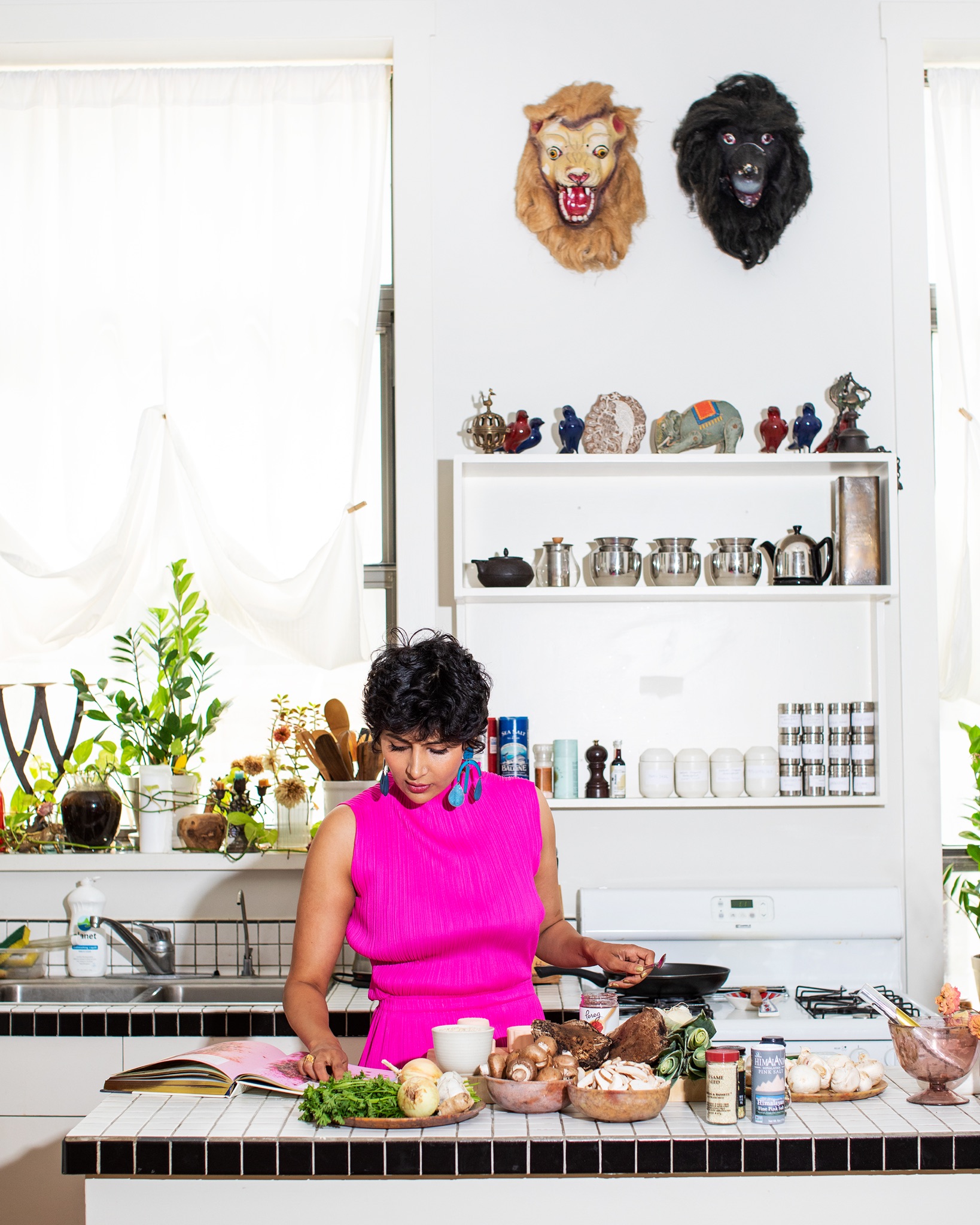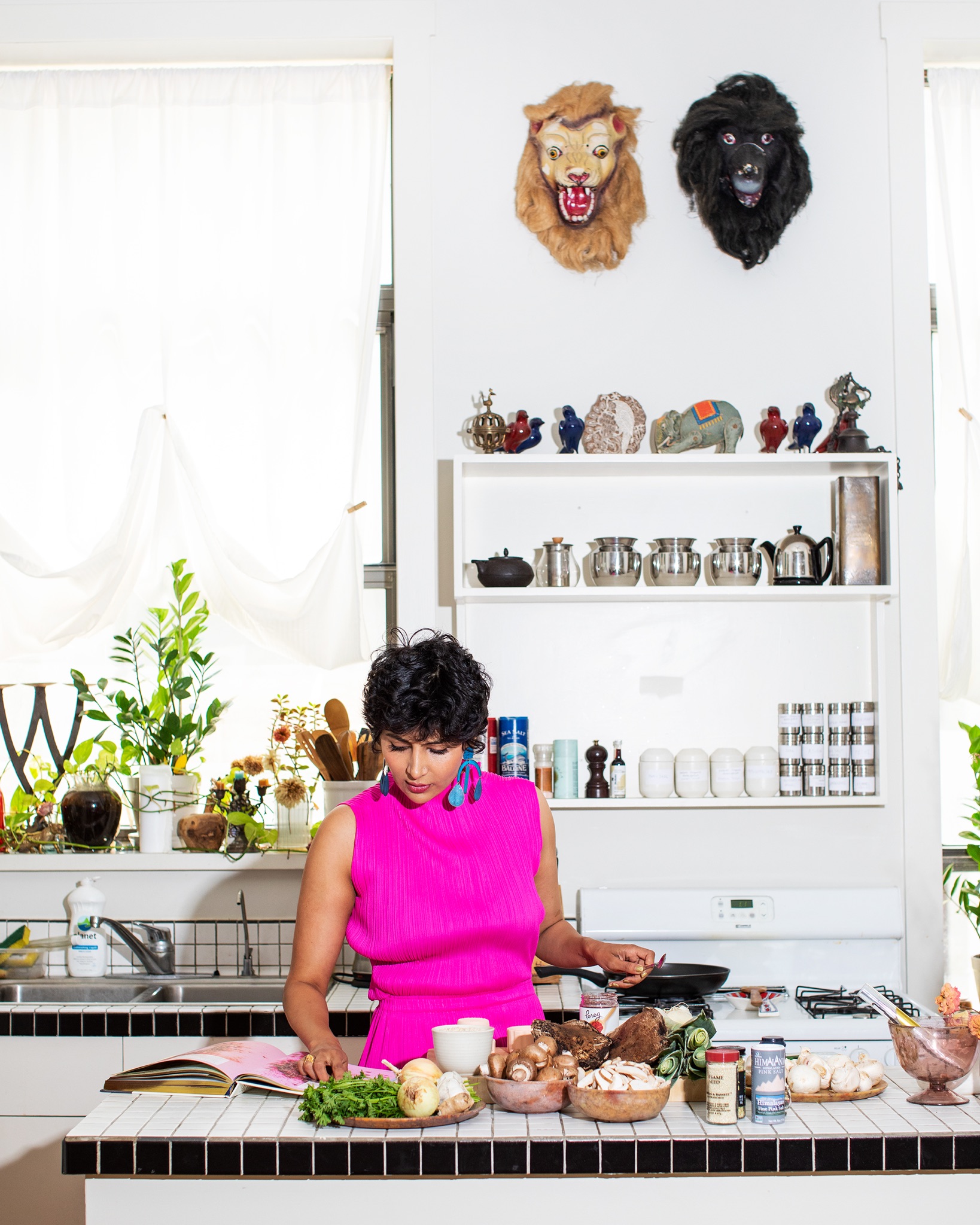Nira Kehar is an award-winning chef trained in French cuisine. She is also self-trained in Ayurvedic principles, which she incorporates in her cooking. For almost six years, Kehar ran the restaurant, Chez Nini, in Delhi, India, serving clients from around the world. Married to a musician, Kehar now spends her time between New York City and Copenhagen. Her cookbook, Ojas, was released in 2018, just months before a chilling diagnosis of breast cancer sent her life reeling. She spoke with me in July from St. Adolphe, Quebec where we cooked a meal of kitchari, salmon, and garlic scapes.

So what are we making today?
We are making Kitchari, which is a slow cooked dish traditionally made of rice, lentils and spices. Kitchari in modern times is often associated with a bland porridge, that Indian moms give their children when they are ill or have a bad stomach, but historically it was known as a delicacy for the royal families. It is rich in nutrition and easy for your body to break down and digestion because of the longer cooking time. Kitchari can also be made with any variety of beans or grains and I also like to top it with either vegetables, all type of proteins and different nuts and seeds. Today we are making a red lentil and quinoa kitchari topped with garlic scapes and pan seared wild-caught salmon.
What drew you towards the culinary arts?
After a debilitating spinal injury I suffered at work, I was catapulted into a life-changing existential crisis. The 8-month recovery period was filled with contemplation and an eventual re-engineering of my life, which brought to light how much I really craved a more creative path for my career. Having been raised in a house where food was the currency for love, I naturally gravitated to the idea of cooking, flavors and feeding.
But your academic background was somewhat untraditional.
I graduated university as a computer engineer, but after my injury, I went to ITHQ in Montreal to do their French culinary program. The prospect of cooking and living a life of creative expression was the most welcome and transformative experience of my life.
What is ayurvedic cooking?
From the young age of ten, I had always been very interested in Ayurveda and it’s very well known sister science, Yoga. This interest had actually stemmed from the book “Autobiography of a yogi” which I first read in an attempt to impress my mother, but it ended up being the equivalent to my “Harry Potter” as a child. This curiosity continued throughout my life and I found myself studying and practicing Ayurveda more than ever when I was cooking professionally. Ayurvedic cooking very organically became synonymous with how I expressed the flavors and compositions in my cuisine. I used the backbone of my Ayurvedic knowledge in order to nourish people instead of just feeding them. I tweaked recipes for the everyday foods people already enjoyed, to incorporate principles of eating for your body type and using herbs and spices for balance.
I think the trouble with many ways of cooking, especially when food comes into the picture in wellness discussions are all the trends out there. There are ‘blood type’ diets which have no scientific basis for instance. But when you describe Ayurveda using broad strokes, it makes sense. A whole-foods approach. Many people get turned off by the term ‘Ayurveda’ because it sounds different, even though the principles have been used for centuries.
Yes I definitely agree with you. We have been eating from the time we are born and will eat pretty much till the day we die. Unlike a lot of the habits and lifestyles that we hang on to and protect whether for cultural reasons or sentimental, I have found that people tend to be surprisingly ready to just completely change what and how they eat based on diets or fads. I find this extremely unhealthy and counter intuitive. Ayurveda on the other hand is fully based on balancing your individual body in an intuitive and gradual way. It’s about building your instincts about your own body type and then slowly making adjustments to strike the balance that nature has implicitly intended for you.
What does the title of your cookbook, “Ojas,” mean?
The closest translation is similar to what is termed “Chi” in Chinese medicine. Ojas is the most subtle bi-product of your digestion. Everything you eat, experience, feel and live all result in this vital energy, which is responsible for your being alive. It is the encapsulation of the “you are what you eat” idea. Eating not being limited to only food, but everything that is taken in by your perceptions and senses.
Interesting word. There are definitely people that seem brighter and more alive, and having healthy ways to deal with stress might be part of it. Perhaps children in general have lots of it. I’ve also seen photos of people who meditate regularly who just look less tense.
Ojas is also enhanced by mediation. A person with good or high Ojas has a bright energy and a glow. Good eating habits, stress managements, the right amount of sleep, loving relationships and an understanding on how to balance your unique body are all very good ways to manage your Ojas. I am determined to be part of the community that is bringing Ayurveda to the mainstream and in turn helping people improve their Ojas.
Shifting gears: What was it like owning a restaurant in India?
Owning my own restaurant was one of the most beautiful experiences of my life. I felt so privileged every day to have each and every customer walk in and allow me to feed them. With the incredibly steep learning curve, came a deep sense of responsibility on what I served these patrons. Where I sourced the ingredients, how I stored them and cooked them was of prime importance. Even more important was the well being and growth of the people who worked with me and put their entire vitality into the everyday running of the restaurant. What they put in would be what the customer would feel. Having a restaurant is famously known to be one of the toughest businesses in the world, and I would say that if you can do it in India you can really do anything. It is not a job for the faint hearted.
Lets talk about what happened in 2018. Your book just came out and you got some unexpected news.
I was diagnosed with breast cancer in April, a month before I was meant to start the promotional tour for my book. The cancer was discovered completely by chance and my doctor truly saved my life, because of a nagging feeling she decided not to let go of.
Five surgeries, fertility treatments, chemotherapy and radiation are all done now, and I have been cancer free for 8 months. It was an indescribably challenging time and in many ways continues to be, but I do also think in has been a surreal sort of blessing. I can never un-know the value of being present and grateful to be alive.
I’m so glad you were able to move through that period, though I know you have to continue to be monitored. It’s also interesting that your doctor had a sense that something was wrong — I’ve written about clinical intuition in that regard, and it’s fascinating. Moving to food and cancer now — there is a lot of misinformation out there around the role of nutrition when it comes to cancer. How did you approach food during all of this?
There is definitely a lack of information and guidance from most doctors on the subject. I was astonished to be told I can eat and drink whatever I wanted and even that it was ok for me to drink wine. I chose to take guidance from my Chinese medicine doctor and Ayurvedic practitioners, to integrate the allopathic treatment with a holistic diet as well as a fasting protocol during chemotherapy. I am not qualified to know what would be best for any other cancer patient to do, but I would strongly suggest making all the efforts to find the right foods and guidance for your body during this very taxing treatment. Even if your medical doctor isn’t qualified in nutrition to give you the right guidance, it is imperative to figure it out with other holistic practitioners. One important thing I made sure to do was to consult with my doctor, about any supplements I was taking because they can severely interfere with your treatments.
The role of nutrition is an interesting area of research, and admittedly I’m reexamining some of my old beliefs about the role of food as we learn more about whether there is a role for intermittent fasting in general and various new protocols for cancer treatment that look at the role of nutrition. It’s a fascinating area to keep an eye on, and like with many areas of medicine, once more data comes in we’re able to re-orient how we approach care. Was there anything else that helped you through this devasting period?
I went to a therapist through most of my treatment and continued for some months afterwards. Your life is turned upside down and it isn’t always possible for those around you to understand what you are going through. As physical as cancer and the treatments are, I experienced a deep sense of calm and vitality by using tools like therapy and transcendental meditation.
What does well-being and ‘Thriving’ mean to you?
Eating whole foods and lots of vegetables. Finding ways that you like to eat them and not falling into the pressures of all the overwhelming information coming our way from all directions. Finding whatever way to laugh everyday and be grateful for whatever it is you have. I write a gratitude journal daily and that really shifted my daily perspective. Also re-evaluating this expectation of constant happiness and instead being content with the little things in life. The second page of my book has the quote that I like to live and cook by, which is “More and more with less and less, until you can do everything with nothing.”
What are you most looking forward to now?
I am trying not to look forward but be in the now. I work everyday on my next book as well enjoy my good health and loving friends and family.


